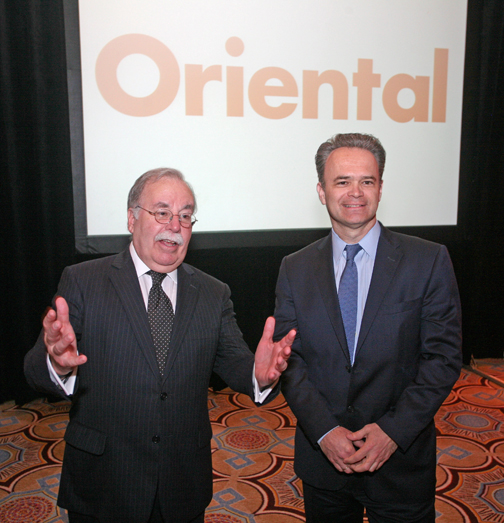Economist: ‘Fiscal issues should be handled by Executive’


Economist José Joaquín Villamil and Bernhard Koepp, senior managing director of New York-based firm International Strategy & Investments. (Courtesy: Oriental)
Puerto Rico’s executive branch has the necessary staff, resources and commitment to take over managing and resolving the island’s fiscal issues and block out all of the “noise” coming out of the Legislature, veteran Economist José Joaquín Villamil recently said.
By leaving major decisions in the hands of lawmakers, Puerto Rico is “generating the image that we can’t get our minds together on a very crucial issue and I think we need to go for some coherence and have the executive branch assume a great deal more leadership,” Villamil said.
Specifically, he said several proposals that have been tossed out by lawmakers in recent weeks — such as taxing cigarettes and imposing extra fees on ATM withdrawals to save the cash-strapped Commonwealth Retirement System — are ultimately creating a “great deal of confusion in the markets because no one is sure what’s going to happen.”
That scenario likely fueled recent decisions by credit ratings powerhouses Fitch, Moody’s and S&P to downgrade Puerto Rico’s credit to near-junk status, coupled with the island’s structurally crippled economy.
“This is a very serious structural problem. Puerto Rico has lost its capacity for growth and that’s a continuation of a trend that began in the mid-70s,” Villamil said. “However, I prefer to use the word ‘contraction’ rather than ‘recession’ to describe it because ‘recession’ suggests that we’ll be walking away from this scenario soon, and it doesn’t work that way.”
Villamil’s assertions were part of preview to the media of a presentation sponsored by Oriental Bank to clients, in which Bernhard Koepp, senior managing director of New York-based firm International Strategy & Investments would also speak.
Despite the bleak prospects, Villamil suggested that businesses have the chance to grow, not because the economy is improving, but because there are particular sectors that are growing or because they’re increasing their market share and that’s as true in banking as it is in retail, as well as other sectors.
“We have certain areas of opportunity, in education, health, construction-related services and knowledge-intensive business services, where Puerto Rico firms could do well,” he said. “For example, Puerto Rico can become a very dynamic force in the growing medical tourism sector because costs of medical services are lower here than in the U.S. mainland and hospital and medical staff are subject to same certification requirements as in the states.”
‘Know what’s going on in the world’
He also said it is crucial for Puerto Rico businesses to “know what’s going on in the world” and carefully consider all of the implications that technology, namely the Internet and broadband, represent for economic activity.
“Internet penetration is increasing in Puerto Rico and so is broadband use. Our studies show that the number of people buying online is growing. We estimate that there are 600,000 people in Puerto Rico who actively purchase online and they estimate spending about $205 a year. That’s a significant amount of money,” he said.
“Businesses have opportunities, but they have to understand what’s going on in the world, in the U.S., and they have to acknowledge the economic environment will continue to be volatile not only because of volatility in commodity prices as well as political in-fighting in the states, but because the way business is done now is changing very, very quickly,” Villamil said.
Meanwhile, Koepp said that while the “entire world is in crisis mode,” stateside economists are not “quite as pessimistic on the U.S. economy as many would think.”
“We’re in sequester now and it’s quite remarkable how capital markets, bond markets, and equity markets have taken a step back and said OK, the politicians are getting dragged through this and they’re incrementally going to move step-by-step in the right direction,” Koepp said. “It’s not the way we would want it necessarily but it’s not these drastic events that we were fearing.”
ISI is predicting the U.S. economy will grow by 3 percent during the latter half of this year and see budgetary progress in general — a far stretch from what is expected to happen in Puerto Rico.













As long as environmentalists, most of whom do not own land
themselves, keep rambling on about stopping construction for
whatever reasons, Puerto Rico will remain on a severe decline.
No new investment or employers will want to relocate there.
Other caribbean islands have managed to find more balanced
approaches that allow for both responsible conservation AND
much needed development. In that regard, environmentists in
Puerto Rico have failed. Of what value is a beautiful island if
people are not progressing economically and crime is the only
source of income?